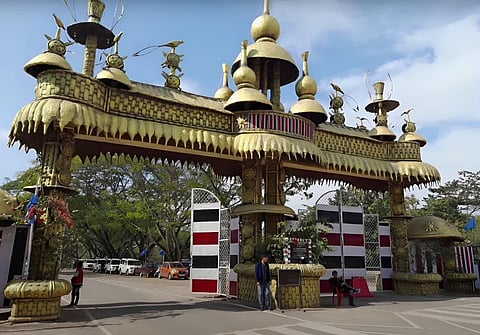Assam's Karbi tribe’s 50 years of perseverance to protect culture
GUWAHATI: When a people-organised festival carries on for 50 years, it becomes an institution.
The week-long celebration of the golden jubilee of Karbi Youth Festival will begin at the Karbi People’s Hall at Taralangso, Diphu in Assam’s Karbi Anglong district on January 13. The Karbi People’s Hall straddles 827 bighas and is the festival’s permanent site.
There is palpable excitement among the Karbis – a tribal community – who await the festival, first celebrated in 1974. It has for years bound them with the ethnic thread.
The festival was conceived by a group of educated youth, led by Roy Enghi. The idea was to preserve the Karbis’ dying culture and traditions.
Chandra Sing Kro, president of the Karbi Cultural Society, said the aim of the festival is to preserve and propagate the culture and traditions of the Karbis.
“Through this festival, we try to preserve our culture, traditional attires and folk songs and dances. Fifty years ago, we almost lost them. Then, Roy Enghi and some other educated youth took up the initiative to keep them alive through this festival,” Kro said.
Another objective is to bring unity and peace, he said.
Karbi Anglong had been restive for three to four decades due to insurgency. Peace returned after various rebel groups signed peace accords with the government.
The Karbi Cultural Society has been organising the festival since 1977, the year it was born. It invites people from other communities – both tribals and non-tribals – to showcase their culture and traditions.
The Karbi Anglong Autonomous Council (KAAC) is a key stakeholder. The organisers have also involved all political parties active in Karbi Anglong, various other organisations and communities. Karbis from 35 zones across the Northeast will take part in the festival.
“The Karbi Cultural Society strongly believes that it is only through culture that we can build a healthy society. We always say that development cannot come without peace. We share ideas at the festival,” Kro said.
He said the Hornbill Festival, which has been organised in Nagaland since 2000, went global because it is a state government-sponsored event, unlike the Karbi Youth Festival which is organised with donations.
“KAAC has a limited budget, yet it tries to help us. We have noticed that the Assam government has started taking some initiative but it has come after a long time,” Kro said.
“Youth tend to get attracted to Western culture. If this continues, our culture, traditions, songs and dances will disappear one day. We feel awareness has to be created,” he added.
Bidya Sing Rongpi, general secretary of the Karbi Cultural Society, said he himself observed Karbi culture and traditions fast disappearing.
“The festival started under Roy Enghi’s leadership. It has helped preserve our traditional dresses, culture, folk songs and folk dances,” Rongpi said.
He said the Karbi Cultural Society also organises workshops to promote Karbi culture, customs and traditions among youth. “We somehow managed to revive some traditional games and promoted them,” he said.
Richard Tokbi, who is an executive member of KAAC and general secretary of the festival’s reception committee, said delegates from several Southeast Asian countries would take part in the festival.
“Normally, the festival is organised with donations received from businessmen and well-wishers. KAAC has taken up the initiative for the golden jubilee. The council started associating with the festival after Tuliram Ronghang took over as its chief. He increased funds for the council’s Department of Culture. Assam government is helping us develop infrastructure,” Tokbi said.
He pointed out that the state government helped build an auditorium, with a seating capacity for 3,000 people, at the festival venue.
“It’s a big achievement for us. This (Karbi People’s Hall) is the largest ethnic village. It represents various ethnic communities – Naga, Kuki, Dimasa, Tiwa, Mizo, Adivasi, Tai-Ahom besides Karbi,” he said.
"People come to Karbi Anglong to study Karbi culture after they learn about the lifestyle, customs, food habits, and cuisines of the community through the festival. The effort of everyone, including KAAC, will be to take these further to the global stage," he added.
This year, the festival will feature over 6,000 cultural performances to be performed on four stages. The visitors will be able to relish ethnic cuisines and buy traditional items. Some 2,000 stalls are being put up.
The highlights will be performances by Scottish hard rock band Nazareth, Mohit Chauhan and Angaraag Mahanta (Papon). The organisers are expecting a footfall of 1.5 lakh people every day.

